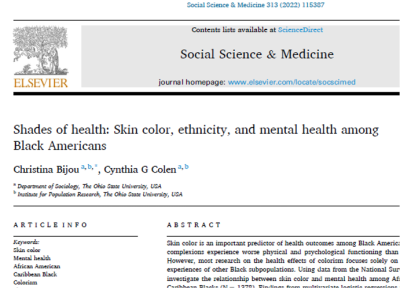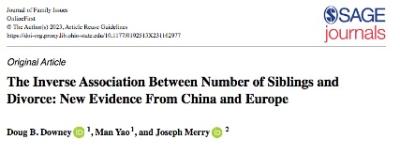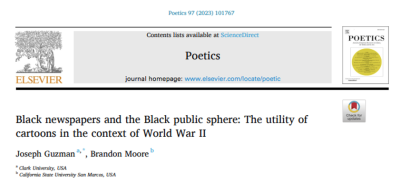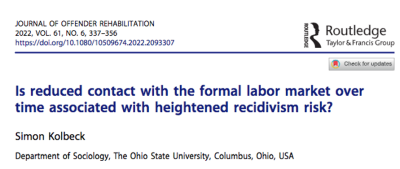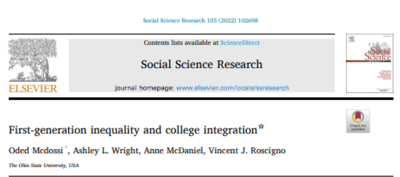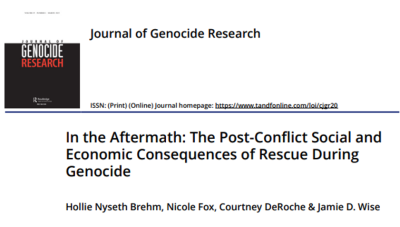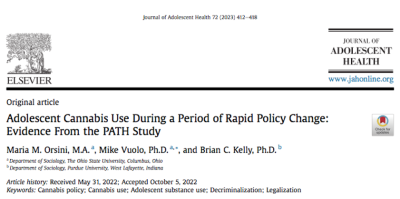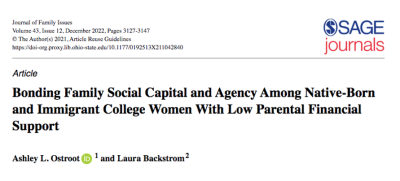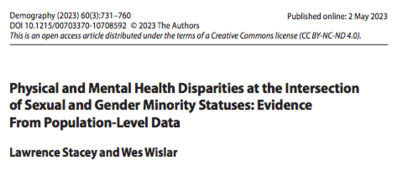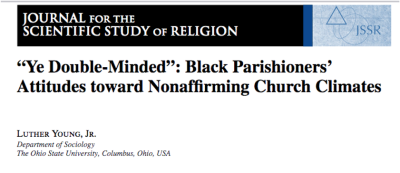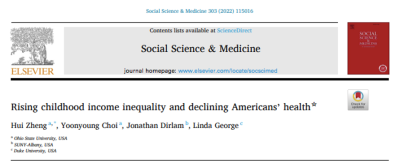Department Research Highlights
Research projects and publication highlights
There are more projects ongoing, which you can discover on our Sociology Department Webpage and by contacting individual faculty members.

Dr. Rachel Dwyer is leading a National Institutes of Health-funded study on “Improving Data Collection of Debt and Financial Strain to Assess Health Impacts of Economic Insecurity.”
This project uses multi-pronged data collection and analysis to build a stronger data infrastructure, more adequate and accurate measures of indebtedness, and best practices for analyzing various forms of indebtedness and their relation to economic hardship and financial strain for low-income families.
Rachel is a former Director of Graduate Studies and very active with graduate students in the department.
Check out a paper she co-authored with Dr. Elizabeth Martin, former OSU Sociology Graduate Student: “Financial Stress, Race, and Student Debt During the Great Recession” in Social Currents.

Dr. Chris Browning is leading an interdisciplinary team of OSU faculty and graduate students in a large scale, longitudinal investigation of the link between socio-spatial exposures and developmental outcomes among youth in Franklin County (Columbus), OH.
The Adolescent Health and Development in Context (AHDC) study was funded by multiple national funding organizations and includes extensive geo-spatial, social network and biomarker data intended to understand how to define adolescents’ social spaces and connections, and how they are related to adolescent health and well-being.
This project has resulted in many innovative publications in Sociology and related fields and advances our understanding of the interplay among social, psychological, and biological processes in shaping youth developmental outcomes such as risk behavior and victimization, mental and physical health, and educational outcomes. Dr. Browning welcomes graduate students to collaborate on this project and to utilize this unique dataset.

Dr. Cindy Colen was recently awarded a National Institutes of Health grant titled, “The Effects of Workplace Social Status on Minority Health Disparities.” The study will use administrative health and earnings records from millions of workers in Utah to examine the causal pathways between workplace social status and minority health disparities.
Dr. Colen is an active member of the Institute for Population Research and publishes high-impact research articles with graduate students, such as: “Racial Disparities in Health among College Educated African Americans: Can HBCU Attendance Reduce the Risk of Subsequent Morbidity in Midlife?” in the American Journal of Epidemiology with former OSU Sociology Graduate Student Nicolo Pinchak.
Dr. Colen published “Shades of health: Skin color, ethnicity, and mental health among Black Americans” in Social Science and Medicine with lead author, former OSU Sociology Graduate Student Christina Bijou.

Dr. Chris Knoester specializes in the study of the sociology of family and the sociology of sport. In his family work, he has mostly focused on studying fatherhood and, most recently, parental leave patterns and attitudes. He has now largely turned to focus on sports and society issues as the principal investigator of the National Sports and Society Survey (NSASS)-- a landmark survey that focuses on patterns of sports involvement over the life course and their links to adults’ attitudes, social patterns, and well-being. There are dozens of untapped projects that can be nurtured from these unique data, including emphases on family, deviance, social connections, health and well-being, gender, race/ethnicity, sexuality, and social class-- over the life course and across generations. Dr. Knoester is always happy to collaborate with students and has been doing so extensively with his NSASS data, in recent years. He is a North American Society for the Sociology of Sport Research Fellow and the Chair of Research for the Ohio State University Sports and Society Initiative.

Dr. Sam Clark is a demographer, epidemiologist, and data scientist who develops new methods and does research in demography and epidemiology. Dr. Clark is a faculty affiliate of the OSU Institute for Population Research and OSU Translational Data Analytics Institute. During 2020 Dr. Clark worked on a survey to estimate the prevalence of the coronavirus and an excess deaths study to characterize the total burden of mortality associated with the COVID-19 epidemic.
Both projects were in the state of Ohio, USA and were conducted by large teams at The Ohio State University in close coordination with the Ohio State Department of Health. On an ongoing basis Dr. Clark works to improve: 1) verbal autopsy as a tool to measure the burden of disease, 2) mathematical models of human mortality, 3) indirect estimates of child mortality, and 4) small-area estimates of mortality. Dr. Clark leads the openVA Team that works to improve verbal autopsy and has been a member of the WHO Verbal Autopsy Reference Group (VARG) since it was formed in 2013.
Below are a subset of articles that our faculty have recently published!
A bolded name indicates a current OSU sociology faculty member. An italicized name indicates a current/former OSU grad student coauthor.
2023
Agbai, Chinyere O. “The Structure of Pandemic Vulnerability: Housing Wealth, Residential Segregation, and COVID-19 Mortality.” Population Research and Policy Review 42, no. 5 (October 9, 2023): 83. https://doi.org/10.1007/s11113-023-09826-7.
Bellair, Paul E., Steven Lopez, Eric LaPlant, Mike Vuolo, and Robert Apel. “Is Work Associated With More or Less Criminal Involvement in the Short-Term? New Evidence of the Former Among a Justice-Involved Sample?” Crime & Delinquency, January 3, 2023, 00111287221140838. https://doi.org/10.1177/00111287221140838.
Colen, Cynthia G., Kelsey J. Drotning, Liana C. Sayer, and Bruce Link. “A Matter of Time: Racialized Time and the Production of Health Disparities.” Journal of Health and Social Behavior, June 28, 2023, 00221465231182377. https://doi.org/10.1177/00221465231182377.
Dugan, Laura, and Daren Fisher. “Far-Right and Jihadi Terrorism Within the United States: From September 11th to January 6th.” Annual Review of Criminology 6, no. 1 (2023): 131–53. https://doi.org/10.1146/annurev-criminol-030521-102553.
Nyseth Brehm, Hollie, Amanda Lea Robinson, and Mini Saraswati. "Triggers of escalations in violence against civilians by non-state actors in Africa." Terrorism and political violence 35, no. 3 (2023): 658-676.
Reczek, Rin, Lawrence Stacey, and Mieke Beth Thomeer. “Parent–Adult Child Estrangement in the United States by Gender, Race/Ethnicity, and Sexuality.” Journal of Marriage and Family 85, no. 2 (2023): 494–517. https://doi.org/10.1111/jomf.12898.
Schmeer, Kammi K., Paola Andrea Echave, and Hollie Nyseth Nzitatira. “Exposure to Armed Conflict and HIV Risk Among Rwandan Women.” Demography 60, no. 4 (August 1, 2023): 1181–1205. https://doi.org/10.1215/00703370-10890357.
2022
Allison, Rachel, Chris Knoester, and B. David Ridpath. "Public opinions about paying college athletes and athletes protesting during the national anthem: A focus on race/ethnicity and political identities." Du Bois Review: Social Science Research on Race 19, no. 1 (2022): 61-83.
Browning, Christopher R., Jake Tarrence, Catherine A. Calder, Nicolo P. Pinchak, and Bethany Boettner. “Geographic Isolation, Compelled Mobility, and Everyday Exposure to Neighborhood Racial Composition among Urban Youth.” American Journal of Sociology 128, no. 3 (November 2022): 914–61. https://doi.org/10.1086/721666.
Carlson, Daniel L., Priya Fielding-Singh, Richard J. Petts, and Kristi Williams. “Between a Rock and a Hard Place: COVID Concerns and Partnered U.S. Mothers’ Employment during the COVID-19 Pandemic.” Socius 8 (January 1, 2022): 23780231221138721. https://doi.org/10.1177/23780231221138721.
Do, D Phuong, and Reanne Frank. “Prior COVID-19 Infection: An Underappreciated Factor in Vaccine Hesitancy in the USA.” Journal of Public Health 44, no. 2 (June 1, 2022): 471–74. https://doi.org/10.1093/pubmed/fdab404.
Downey, Douglas B., Megan Kuhfeld, and Margriet van Hek. “Schools as a Relatively Standardizing Institution: The Case of Gender Gaps in Cognitive Skills.” Sociology of Education 95, no. 2 (April 1, 2022): 89–109. https://doi.org/10.1177/00380407211070319.
Johnson, Anthony M. “Collaborating in Class: Social Class Context and Peer Help-Seeking and Help-Giving in an Elite Engineering School.” American Sociological Review 87, no. 6 (December 1, 2022): 981–1006. https://doi.org/10.1177/00031224221130506.
Knoester, Chris, and Qi Li. “Preferences for Paid Paternity Leave Availability, Lengths of Leave Offerings, and Government Funding of Paternity Leaves in the United States.” Sociological Perspectives 65, no. 2 (April 1, 2022): 374–97. https://doi.org/10.1177/07311214211001892.
Melamed, David, Brent Simpson, Bradley Montgomery, and Vedang Patel. “Inequality and Cooperation in Social Networks.” Scientific Reports 12, no. 1 (April 26, 2022): 6789. https://doi.org/10.1038/s41598-022-10733-8.
Reczek, Rin, Lawrence Stacey, and Chloe Dunston. “Friend, Foe, or Forget ‘em?: The Quality of LGBTQ Adult Sibling Relationships.” Journal of Marriage and Family 84, no. 2 (2022): 415–37. https://doi.org/10.1111/jomf.12821.
Roscigno, Vincent J., Hui Zheng, and Martha Crowley. “Workplace Age Discrimination and Social-Psychological Well-Being.” Society and Mental Health 12, no. 3 (November 1, 2022): 195–214. https://doi.org/10.1177/21568693221116139.
Schoon, Eric W.. “Operationalizing Legitimacy.” American Sociological Review 87, no. 3 (June 1, 2022): 478–503. https://doi.org/10.1177/00031224221081379.
Vuolo, Mike, Lesley E. Schneider, and Eric G. LaPlant. “Employment Application Criminal Record Questions and Willingness to Apply: A Mixed Method Study of Self-Selection.” American Journal of Sociology 128, no. 2 (September 2022): 552–92. https://doi.org/10.1086/722293.
Young, Jacob T.N., and Dana L. Haynie. “Trusting the Untrustworthy: The Social Organization of Trust Among Incarcerated Women.” Justice Quarterly 39, no. 3 (April 27, 2022): 553–84. https://doi.org/10.1080/07418825.2020.1807588.
Zheng, Hui, Yoonyoung Choi, Jonathan Dirlam, and Linda George. “Rising Childhood Income Inequality and Declining Americans’ Health.” Social Science & Medicine 303 (June 2022): 115016. https://doi.org/10.1016/j.socscimed.2022.115016.
Below are the books that our faculty have recently published!
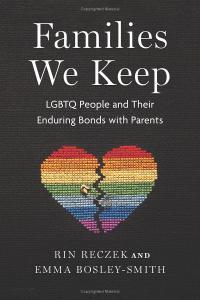
Families We Keep
Drawing on interviews with over seventy-five LGBTQ people and their parents, Families We Keep (2022) explores the powerful ties that bind families together, for better or worse.
Dr. Rin Reczek and Dr. Emma Bosley-Smith (former OSU Sociology Graduate Student) challenge deep-rooted convictions that family—and specifically, relationships with parents—should be maintained at any cost.
Families We Keep shines a light on the shifting importance of family in America, and how LGBTQ people navigate its complexities as adults.
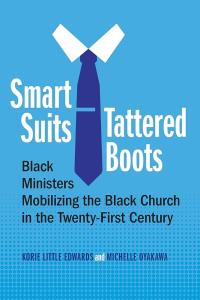
Smart Suits, Tattered Boots
Dr. Korie Little Edwards has written numerous books. The latest book, Smart Suits, Tattered Boots: Black Ministers Mobilizing the Black Church in the Twenty-First Century (with Dr. Michelle Oyakawa, former OSU Sociology Graduate Student), draws on the case of Ohio black religious leaders’ voter mobilization efforts leading up to the 2012 election to explore when, how, and why black religious leaders engage in broad-based mobilization in the twenty-first-century United States
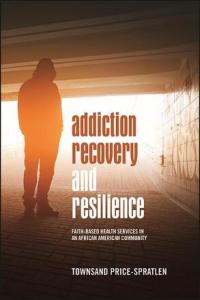
Addiction Recovery and Resilience
Dr. Townsand Price-Spratlen’s recent book, Addiction Recovery and Resilience (2022) was developed from a yearslong ethnographic case study of a faith-based health organization with a focus on long-term recovery. It explores the organization's triumphs and missteps as it has worked to respond to the opioid crisis and improve the health of affiliates and the neighborhood for nearly twenty years.
Addiction Recovery and Resilience concludes with best practices for individual, organizational, and community health and public policy at a time when nontraditional health care providers are increasingly important.
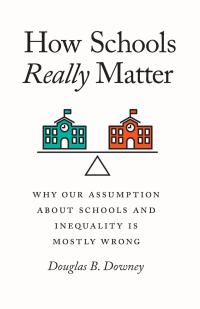
How Schools Really Matter
How Schools Really Matter (2019), by Dr. Douglas Downey, posits that schools play a more positive role than typically thought and that the core sources of inequality are in our broader policy decisions. Dr. Downey is increasingly interested in how technological change is influencing inequality and our social lives more broadly.
In a project motivated by this interest in technology, Dr. Ben Gibbs (former OSU Sociology graduate student) and Dr. Downey consider whether children’s face-to-face social skills are declining.
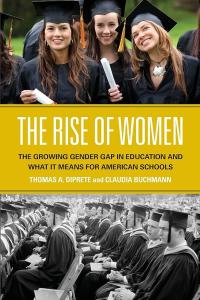
The Rise of Women
The rise of women: The growing gender gap in education and what it means for American schools (2013) by Dr. Claudia Buchmann and her colleague Dr. Thomas DiPrete use multiple sources of data to provide a detailed and accessible account of women’s educational advantage and suggest new strategies to improve schooling outcomes for both boys and girls.
As the value of a highly skilled workforce continues to grow, The Rise of Women argues that understanding the source and extent of the gender gap in higher education is essential to improving our schools and the economy.
